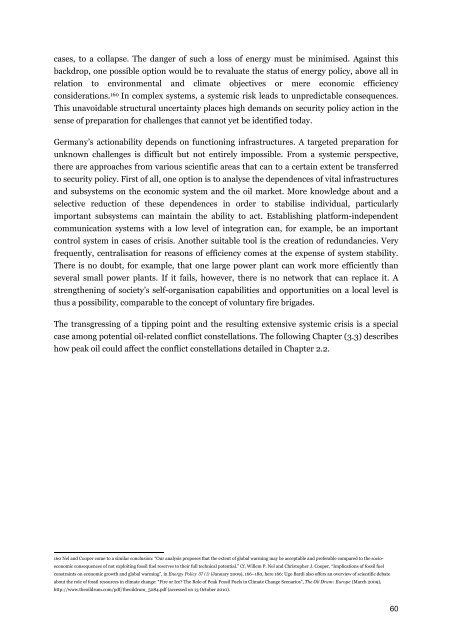PEAK OIL
PEAK OIL
PEAK OIL
Create successful ePaper yourself
Turn your PDF publications into a flip-book with our unique Google optimized e-Paper software.
cases, to a collapse. The danger of such a loss of energy must be minimised. Against this<br />
backdrop, one possible option would be to revaluate the status of energy policy, above all in<br />
relation to environmental and climate objectives or mere economic efficiency<br />
considerations. 160 In complex systems, a systemic risk leads to unpredictable consequences.<br />
This unavoidable structural uncertainty places high demands on security policy action in the<br />
sense of preparation for challenges that cannot yet be identified today.<br />
Germany’s actionability depends on functioning infrastructures. A targeted preparation for<br />
unknown challenges is difficult but not entirely impossible. From a systemic perspective,<br />
there are approaches from various scientific areas that can to a certain extent be transferred<br />
to security policy. First of all, one option is to analyse the dependences of vital infrastructures<br />
and subsystems on the economic system and the oil market. More knowledge about and a<br />
selective reduction of these dependences in order to stabilise individual, particularly<br />
important subsystems can maintain the ability to act. Establishing platform-independent<br />
communication systems with a low level of integration can, for example, be an important<br />
control system in cases of crisis. Another suitable tool is the creation of redundancies. Very<br />
frequently, centralisation for reasons of efficiency comes at the expense of system stability.<br />
There is no doubt, for example, that one large power plant can work more efficiently than<br />
several small power plants. If it fails, however, there is no network that can replace it. A<br />
strengthening of society’s self-organisation capabilities and opportunities on a local level is<br />
thus a possibility, comparable to the concept of voluntary fire brigades.<br />
The transgressing of a tipping point and the resulting extensive systemic crisis is a special<br />
case among potential oil-related conflict constellations. The following Chapter (3.3) describes<br />
how peak oil could affect the conflict constellations detailed in Chapter 2.2.<br />
160 Nel and Cooper come to a similar conclusion: “Our analysis proposes that the extent of global warming may be acceptable and preferable compared to the socioeconomic<br />
consequences of not exploiting fossil fuel reserves to their full technical potential.” Cf. Willem P. Nel and Christopher J. Cooper, “Implications of fossil fuel<br />
constraints on economic growth and global warming”, in Energy Policy 37 (1) (January 2009), 166–180, here 166: Ugo Bardi also offers an overview of scientific debate<br />
about the role of fossil resources in climate change: “Fire or Ice? The Role of Peak Fossil Fuels in Climate Change Scenarios”, The Oil Drum: Europe (March 2009),<br />
http://www.theoildrum.com/pdf/theoildrum_5084.pdf (accessed on 13 October 2010).<br />
60


